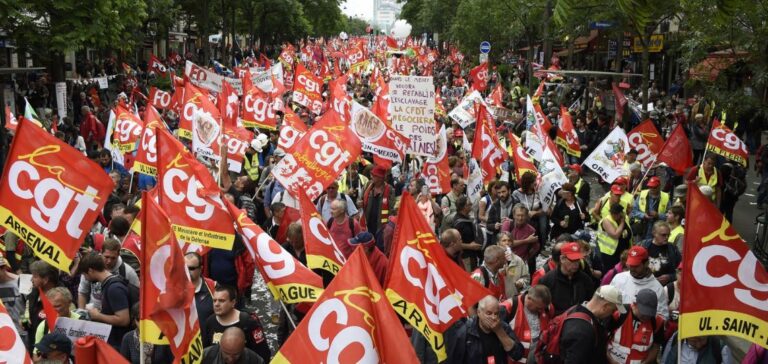Several dozen CGT activists demonstrated Tuesday against the possible dismissal of agents of the gas distributor GRDF, cutting the power of the building where they were received for their disciplinary interview, a few months after a long and bitter conflict on wages.
Four agents of GRDF Ile-de-France were heard individually Tuesday in a Parisian building throughout the day, two of which were threatened with dismissal, according to the CGT. It describes them as being among the “most active members of the strike that took place from the end of October to December last year to demand an increase in salaries”.
At the end of the morning, several agents deployed a giant banner “EDF-GDF 100% public”, under which they hid to allow one of them to carry out “the setting in sobriety (voluntary cut of the current, editor’s note) of the private mansion” where were to be received the agents. “An outage occurred this morning in Paris, but only concerned the site in question,” confirmed to AFP the electricity distributor Enedis, which said that the power had been restored. Enedis has announced its intention to file a complaint, as it does for each incident of this type.
The demonstrators denounced the possible dismissals of Aminata and Matthyeu, “two CGT colleagues from the Alfortville intervention agency”, against whom “fabricated cases” have been made, according to Jordan Robichon, of the CGT Energie Ile-de-France. The two employees threatened with dismissal have been heard by the company’s management, which has not pronounced any sanction at this stage, said the CGT at the end of the day.
Contacted by AFP, the management of GRDF expressed the wish “not to comment on these individual and personal interviews” and did not indicate what it reproached the employees targeted by the procedures. “At the base, we are at two, three procedures per year, here, we have more procedures in a few months than the last six, seven years combined,” Robichon assured.
After a strike lasting several weeks, GRDF management signed a wage agreement in November with three unions (CFDT, CFE-Energie, FO) providing for a 2.3% increase, in addition to an increase in the national basic wage (SNB) obtained at branch level. But the CGT, which has a majority within GRDF, has continued the movement, particularly in regions where the movement was the hardest, such as the Ile-de-France, considering these advances insufficient.
An agreement was finally reached for the company’s 12,000 employees, providing for an additional monthly bonus of at least 50 euros by 2023, and up to 87 euros for the lowest salaries, bringing the increase for all to at least 200 euros gross per month.






















